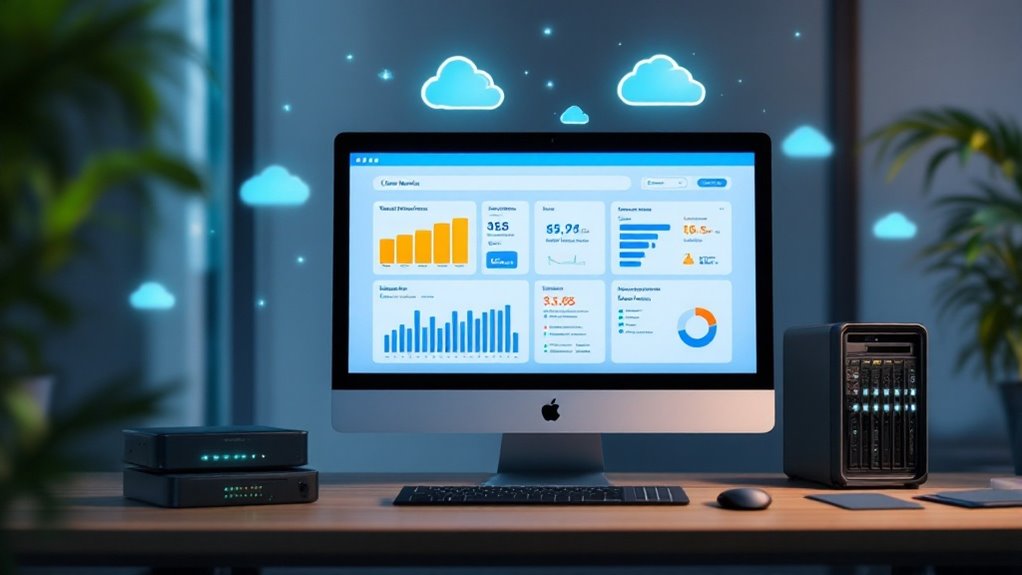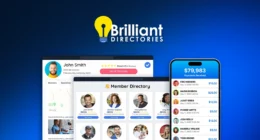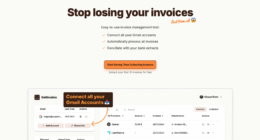Small business backup software protects essential company data from hardware failures, cyberattacks, and human errors. Modern solutions offer automated backups, robust encryption, and ransomware protection to prevent costly data loss incidents. Both cloud-based and on-premises options provide thorough protection, with hybrid solutions offering the best of both worlds. Implementing proper backup strategies is indispensable, as 60% of small businesses close after major data losses. Understanding the key features and best practices will guarantee effective data protection.
Quick Overview
- Small business backup software protects critical data from loss due to hardware failures, cyberattacks, human errors, and natural disasters.
- Modern backup solutions offer automated scheduling, encryption, and user-friendly interfaces to simplify data protection for small businesses.
- Hybrid backup systems combine local storage for fast recovery with cloud storage for secure off-site data protection.
- Quality backup software includes ransomware protection features to prevent data loss and avoid costly recovery payments.
- The 3-2-1 backup rule recommends maintaining three copies, on two different media types, with one copy stored off-site.
Why Small Business Backup Software Matters

Small businesses face a vital responsibility when it comes to protecting their valuable data. Studies reveal that 60% of small and medium-sized businesses shut down within six months after experiencing significant data loss, making reliable backup solutions essential for survival.
Backup software serves multiple vital purposes for small businesses. It safeguards against various threats, including hardware failures, human errors, natural disasters, and cyberattacks. When ransomware strikes, proper backups enable companies to restore their data without paying costly ransoms. Additionally, backup solutions help businesses maintain regulatory compliance, avoiding expensive fines and legal issues. Hybrid approach solutions offer an optimal combination of local backup speed and cloud security, providing comprehensive protection for business data.
Regular backups guarantee business continuity by protecting customer records, financial data, and project files. With cloud-based options, companies can maintain operations even when physical offices become inaccessible, making backup software an indispensable tool for modern business resilience.
Essential Features of Modern Backup Solutions
Modern backup solutions require specific essential features to effectively protect small business data in today’s digital landscape. The most critical elements include robust security measures like AES-256 encryption and multi-factor authentication, which safeguard sensitive information from unauthorized access and cyber threats.
Automated and scheduled backups form another cornerstone of effective solutions, eliminating human error through systematic data protection. These systems offer flexible scheduling options and incremental backups to optimize storage and bandwidth usage. The best solutions also provide user-friendly management interfaces with centralized controls and remote access capabilities. With the rise in cyber attacks, implementing solutions with ransomware protection has become crucial for business continuity.
Additionally, modern backup systems must deliver strong recovery features, including instant restoration, versioning, and geo-redundant storage. Scalability remains equally important, offering unlimited storage options and compatibility across various operating systems and platforms.
Protecting Business Data From Ransomware Attacks

The growing threat of ransomware attacks demands robust data protection strategies for business survival. With 56% of attacks targeting small businesses and recovery costs forcing 60% to close, implementing extensive backup solutions is critical. Modern backup strategies must incorporate both preventive measures and recovery capabilities. Many organizations who fall victim to ransomware face demands between 10,000 and 100,000 dollars, making proper protection essential.
| Protection Layer | Key Actions | Implementation |
|---|---|---|
| Prevention | Employee Training | Regular phishing simulations |
| Backup Strategy | 3-2-1 Rule | Three copies, two media types |
| Recovery Plan | Testing Protocol | Bi-annual drills and updates |
Small businesses should focus on creating immutable backups that ransomware cannot modify or delete. Air-gapped storage solutions provide an additional layer of protection by physically isolating backup data from network-connected systems. Regular testing of backup integrity and recovery processes guarantees business continuity when faced with an attack.
Choosing Between Cloud and On-Premises Backups
Building on effective ransomware protection strategies, businesses must carefully weigh their options between cloud and on-premises backup solutions. Each approach offers distinct advantages and challenges that align with different business needs and priorities.
Cloud backup solutions provide scalable storage and remote accessibility, making them ideal for growing businesses with distributed teams. However, they require reliable internet connectivity and may incur higher long-term costs.
On-premises solutions deliver faster recovery times and complete control over data, perfect for companies with strict privacy requirements. Yet, they demand significant upfront investment and ongoing maintenance.
A hybrid approach combining both solutions offers the advantage of storing frequently accessed data locally while keeping long-term archives in the cloud.
The final choice depends on several key factors: data recovery speed requirements, budget structure, growth projections, compliance needs, and risk tolerance levels. Small businesses should evaluate these elements against their specific operational demands before making a decision.
Top Backup Software Tools for Small Businesses

Selecting robust backup software stands as a critical decision for small businesses aiming to protect their digital assets. Today’s market offers diverse solutions across three main categories: cloud-based, local, and hybrid backup systems.
Leading cloud providers like Backblaze and IDrive offer cost-effective options starting at under $100 annually, with features like unlimited storage and multi-device support. For businesses preferring local control, solutions like Veeam and EaseUS Todo Backup deliver powerful on-premises tools with automated scheduling and disaster recovery capabilities. Companies seeking the best of both worlds can choose hybrid solutions from providers like HYCU or Acronis, which combine local and cloud storage while maintaining strong security features. These solutions typically include intelligent backup insights through comprehensive analytics dashboards that help businesses optimize their storage usage.
Key considerations when choosing backup software include end-to-end encryption, continuous backup capabilities, and scalability options that grow alongside business needs.
Best Practices for Data Backup and Recovery
Implementing effective data backup practices stands as a cornerstone of business continuity in today’s digital landscape. Small businesses must protect their valuable data through systematic approaches that balance security with accessibility.
Understanding and following proven backup strategies helps prevent catastrophic data loss while guaranteeing quick recovery when needed. Ensuring proper data encryption methods during storage and transfer adds another critical layer of protection for business information.
- Follow the essential 3-2-1 backup rule: maintain three copies of data, store them on two different types of media, and keep one copy off-site or in the cloud.
- Schedule regular backup testing and verification to certify data can be recovered when needed, including monthly restoration drills and quarterly disaster recovery scenarios.
- Implement role-based access controls and employee training programs to maintain backup security while creating clear guidelines for data handling and storage procedures.
Frequently Asked Questions
How Often Should Small Businesses Test Their Backup Recovery Processes?
Small businesses should test their backup recovery processes monthly at minimum, with critical data tested weekly. Industry regulations, operational needs, and risk levels influence the frequency.
A balanced approach includes:
- Weekly verification of critical operational data
- Monthly test restores of complete data sets
- Quarterly full system recovery simulations
- Additional testing after significant system changes
This schedule helps guarantee business continuity while remaining manageable for smaller organizations with limited IT resources.
Can Backup Software Protect Against Insider Threats and Unauthorized Data Access?
Modern backup software offers robust protection against insider threats and unauthorized access through multiple security layers. Key features include immutable backups that prevent data tampering, encryption during transit and storage, and granular access controls that restrict user permissions.
Additionally, AI-powered behavior analytics detect suspicious activities, while detailed audit trails track all system interactions. Two-factor authentication and role-based access further strengthen security by ensuring only authorized personnel can access sensitive data.
What Internet Speed Is Required for Efficient Cloud Backup Solutions?
Efficient cloud backup solutions typically require a minimum upload speed of 2-3 Mbps per user for basic operations. For businesses backing up 12 GB of data daily, a dedicated 1 Mbps connection is sufficient.
However, organizations with larger datasets or frequent backups may need 100 Mbps or more. The ideal speed depends on factors like user count, data volume, and backup frequency. Symmetric bandwidth plans offer the best performance for continuous cloud operations.
How Long Should Small Businesses Retain Different Types of Backed-Up Data?
Small businesses should follow specific retention periods for different data types. Financial and tax records require 7 years of retention, while employee data needs 3-7 years.
Customer contracts should be kept for the contract duration plus statute limitations. Daily operational data typically requires 90 days to 1 year, and marketing data 1-3 years.
Critical business records and intellectual property should be retained indefinitely, while routine backups can follow a 30-90 day rolling schedule.
Are Free Backup Software Solutions Adequate for Small Business Needs?
While free backup solutions offer cost savings and basic functionality, they generally fall short for small business needs. The contrast between their limited features and business requirements is stark: free options lack vital security measures, adequate technical support, and scalability.
Though suitable for non-critical data, they’re insufficient for protecting sensitive business information or ensuring regulatory compliance. A hybrid approach, combining free and paid solutions, often provides better protection while managing costs effectively.
Conclusion
Like a safety net for a high-wire act, reliable backup software provides essential protection for small businesses in today’s digital world. By implementing robust backup solutions, following security best practices, and maintaining regular recovery testing, companies can guarantee their valuable data against threats and disasters. The right backup strategy, whether cloud-based or on-premises, secures business continuity and peace of mind in an increasingly complex technological landscape.








